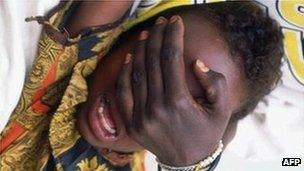Schools enlisted to combat female genital mutilation
- Published

Mike Russell said education was a key part of eradicating female genital mutilation
Every head teacher in Scotland is to be asked to train staff and educate parents about female genital mutilation (FGM).
Campaigners have described the illegal practice as "torture" and a "form of child abuse".
Mr Russell said education was a key part of eradicating FGM.
The Scottish Parliament last week heard that 3,000 girls in Scotland were at risk.
FGM takes different forms but traditionally involves the full or partial removal of young girls' genitals for non-medical reasons.
The cutting is carried out for a number of reasons but in many areas girls are cut to improve their marriage prospects.
The practice is most common in the western, eastern, and north-eastern regions of Africa, in some countries in Asia and the Middle East.
It has long been associated with countries such as Egypt, Somalia and Sierra Leone.
'Fairer society'
Scottish Liberal Democrat justice spokeswoman Alison McInnes said: "Following the parliamentary debate on female genital mutilation, I welcome the swift response of Scottish ministers to our call for action.
"Equipping schools with information and resources is crucial if we are to end the risk for children who are living in Scotland.
"I hope that this is the first step of action on a path that must lead towards building a fairer society where girls and women have the right to control their own bodies and live free from the fear of violence."
A recent BBC investigation revealed concerns that young girls were being brought to Scotland to undergo FGM because the country was seen as a "soft touch".
Agencies have claimed that families from England and Europe had travelled to Scotland to have their daughters cut.
They also said girls living in Glasgow and Edinburgh had undergone FGM in Scotland and the problem was increasing.
Equalities Minister Shona Robison said anyone who was aware of FGM had a duty report it.
She said those who had aided or carried out the procedure, either in Scotland or abroad, faced up to 14 years imprisonment.
It is estimated about 140 million girls and women worldwide are currently living with the consequences of FGM.
From April, all NHS hospitals in the UK will be able to record if a patient has undergone FGM or if there is a family history of it.
So far, no-one in the UK has been prosecuted for carrying out FGM.
- Published6 February 2014
- Published15 November 2013
- Published15 November 2013
- Published4 November 2013
- Published6 September 2013
- Published25 July 2013
- Published2 February 2013